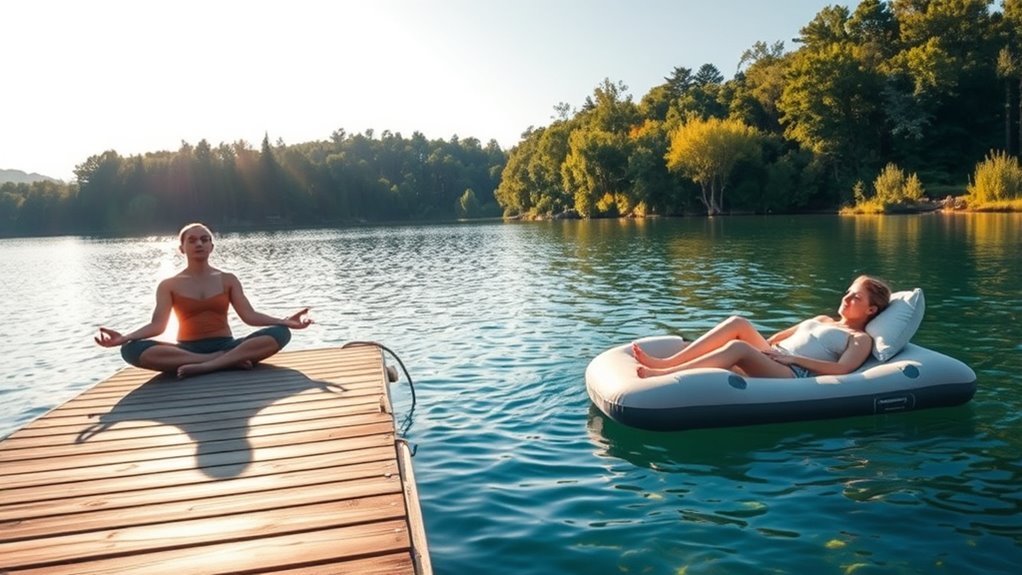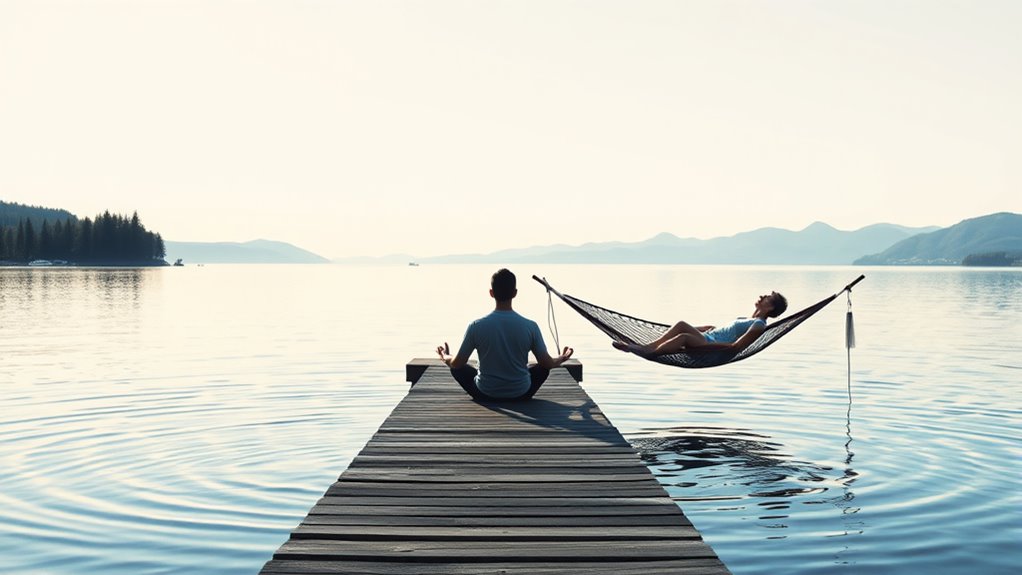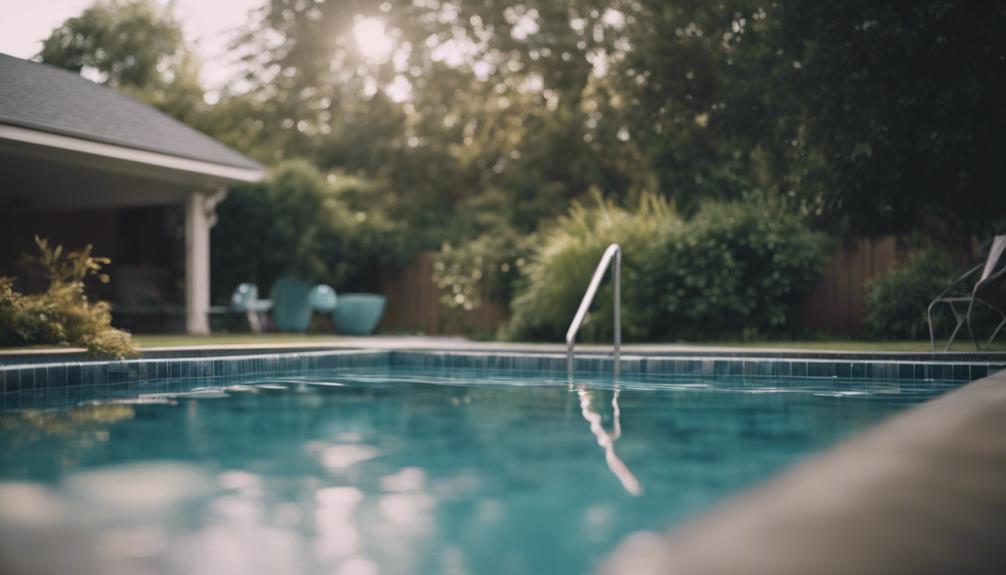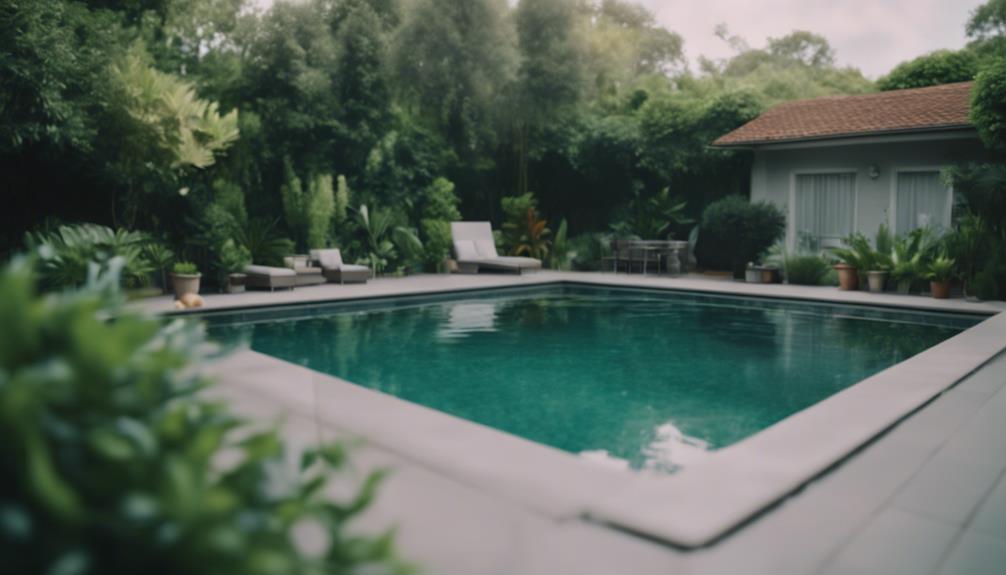Meditation helps you build mental clarity, reduce stress, and improve focus over time, but it requires consistent practice and a quiet space. Napping on water offers immediate relaxation, physical tension relief, and quick energy boosts, though it’s less effective for long-term mental benefits. Both methods suit different needs; meditation fosters discipline, while water napping provides instant refreshment. Keep exploring to find out which option aligns best with your wellness goals.
Key Takeaways
- Meditation enhances mental clarity, reduces stress, and offers long-term benefits, while water napping provides quick physical and mental recharge.
- Meditation requires a quiet, undisturbed environment and consistent practice for effectiveness; water napping is more spontaneous but environment-sensitive.
- Meditation improves focus, sleep quality, and mindfulness skills, whereas water napping relaxes muscles and alleviates physical tension quickly.
- Meditation may take time to show benefits and demands discipline; water napping offers immediate relief but less mental discipline.
- Both methods complement each other, with meditation emphasizing long-term mental health and water napping focusing on immediate relaxation.

When it comes to rejuvenating your mind and body, both meditation and napping on water offer unique benefits, but choosing between them depends on your goals and circumstances. If you’re seeking a quick mental reset or want to enhance your focus, meditation might be the better choice. By practicing mindfulness techniques during meditation, you learn to anchor your attention, reduce stress, and improve your overall mental clarity. This mental discipline can help you feel more centered and calm throughout the day. Meditation also influences sleep quality positively, especially when integrated into a regular routine, by calming your nervous system and promoting deeper, more restful sleep at night. Additionally, the use of high-quality projectors can create an immersive environment that enhances your meditation experience by providing visual stimuli that promote relaxation.
Meditation enhances mental clarity and reduces stress through mindfulness techniques and regular practice.
On the other hand, if you’re physically exhausted or simply need to recharge quickly, napping on water might serve you better. Floating or resting on water can create a soothing environment that encourages relaxation. The gentle buoyancy reduces physical tension, which allows your muscles to unwind more effectively. This form of napping can be especially beneficial if you’re dealing with fatigue or sleep deprivation, as it can help replenish your energy levels faster than traditional land naps. furthermore, the calming presence of water can serve as a natural stress reliever, helping your mind drift away from worries and distractions. While napping on water doesn’t directly teach mindfulness techniques, it can still foster a state of subconscious mindfulness by encouraging you to focus on your breath, sensations, or the gentle movements of water.
However, there are some considerations to keep in mind. Meditation requires a quiet, undisturbed space, and it’s most effective when you’re committed to a regular practice. It might take some time to notice significant improvements in sleep quality or mental clarity. Conversely, napping on water can be more spontaneous but may not be suitable in all environments or for everyone, especially those with balance issues or certain health conditions. It also doesn’t promote the same mental discipline as meditation does, so if your goal is to cultivate mindfulness, meditation offers a more direct path.
Ultimately, your choice depends on what you’re aiming for: If mental clarity and stress reduction are your priorities, meditation incorporating mindfulness techniques can deliver long-term benefits. If you need immediate physical or mental relief and enjoy being near water, napping on water can be a quick, soothing remedy. Both methods can complement each other, giving you versatile options to enhance your overall well-being.
Frequently Asked Questions
Can Water-Based Meditation or Napping Improve Mental Health?
Water-based meditation or napping can notably improve your mental health. Floatation therapy offers deep relaxation that reduces stress, anxiety, and enhances mood. Water mindfulness helps you stay present, calming your mind. Regularly engaging in these practices can boost your mental clarity, resilience, and overall well-being. By embracing water-based relaxation, you give yourself a powerful tool to manage daily stress and promote mental health.
Are There Safety Concerns for Water-Based Relaxation Activities?
Ever wondered what lurks beneath the calm surface? Water-based relaxation activities do carry safety concerns, especially around water safety and drowning risks. You should always stay vigilant, wear life jackets if needed, and never indulge alone. Are you prepared to prioritize safety? Taking these precautions helps you enjoy the calming benefits without risking harm. Remember, respecting water’s power is essential for a safe and soothing experience.
Which Activity Is More Suitable for Beginners: Meditation or Napping?
For beginners, meditation is a more suitable relaxation method because it involves a simple mindfulness technique you can practice anywhere, including on the water. It helps calm your mind and improves focus without requiring physical exertion or special conditions. Napping might be tempting, but it can be harder to do safely on water if you’re not experienced. Starting with meditation allows you to build relaxation skills gradually and safely.
How Do Water Temperature and Environment Affect These Practices?
You’ll find that water temperature and environmental factors substantially influence your experience. If the water’s too cold or hot, it can distract you from meditation or make napping uncomfortable. Calm, quiet environments enhance relaxation, while noisy or windy surroundings might cause interruptions. Adjusting water temperature to a comfortable range, and choosing a peaceful setting, helps you stay focused and fully benefit from either practice.
Can These Practices Help Manage Stress and Anxiety Effectively?
Yes, both practices can effectively manage stress and anxiety when combined with mindfulness benefits and relaxation techniques. Meditation helps you focus on the present moment, reducing mental clutter, while napping on water offers calming visuals and sounds that promote relaxation. Engaging in these activities regularly allows you to develop resilience against stress, improve mood, and enhance overall well-being through mindful awareness and soothing environments.
Conclusion
Ultimately, whether you choose to meditate or nap on the water, you embrace a moment of serenity amidst gentle ripples and shimmering reflections. Imagine feeling the cool breeze caress your skin as your mind drifts into calm or restful stillness, each option offering a unique path to renewal. Both allow you to reconnect with nature’s soothing embrace, leaving you refreshed like the tranquil surface beneath you. Embrace the choice that best aligns with your soul’s quiet call.










